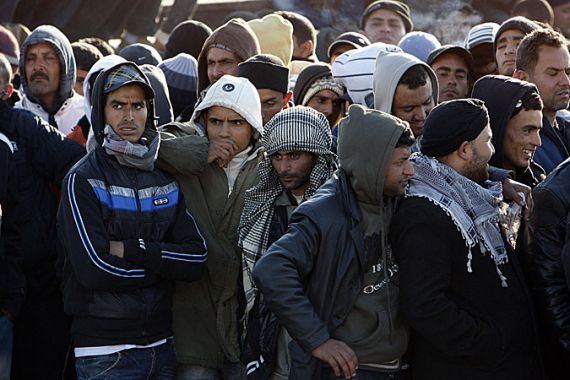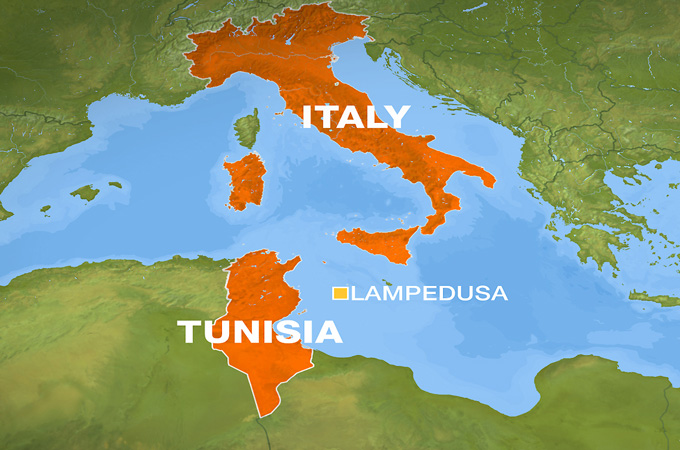Italy struggles with Tunisia influx
Rome calls on European Union for help after 6,000 Tunisians flee to tiny island following political upheaval.

Italy is struggling to cope with a flood of refugees escaping political upheaval in Tunisia, with around 6,000 crossing the sea to the tiny island of Lampedusa in the last week.
The Italian government has appealed to the European Union for aid after declaring a humanitarian crisis over the weekend, and is hoping that Frontex, the EU border agency, will get involved.
Keep reading
list of 4 items‘Mama we’re dying’: Only able to hear her kids in Gaza in their final days
Europe pledges to boost aid to Sudan on unwelcome war anniversary
Birth, death, escape: Three women’s struggle through Sudan’s war
At least 2,000 refugees have been ferried to Sicily where their fate is yet to be decided. Another 2,000 remain on the tiny outcrop, which lies in between Africa and Italy, housed in a re-opened holding centre.
Catherine Ashton, the EU foreign policy chief, is currently visiting Tunisia to discuss the issue.
On Monday she expressed support for the country’s interim administration, installed following the ousting of president Zine El Abidine Ben Ali.
“The European Union is committed to supporting Tunisia economically and to supporting civil society in order to have free elections,” she said in Tunis, the capital.
Diplomatic row
But Angela Merkel, Germany’s chancellor, said “not everyone who does not want to be in Tunisia can come to Europe”.
“Rather, we need to talk to each other how we can strengthen the rule of law in Tunisia again and whether Europe can be of help,” she said.
The crisis sparked a brief row between Tunis and Rome, after an Italian minister suggested sending police to the north African country in an attempt to stem the tide of migrants.
Roberto Maroni, the interior minister and a member of the anti-immigrant Northern League, said the turmoil in Tunisia had triggered a “biblical exodus” to the island.
 |
“I will ask the Tunisian foreign minister for authorisation so an Italian contingent can intervene to block the influx. The Tunisian system is collapsing,” he said on Sunday.
The Tunisian foreign ministry said it was prepared to work with Italy and other partners to find an appropriate solution, but said it “categorically rejects any interference in its internal affairs or any infringement of its sovereignty”.
Italy’s foreign minister has since said that the two countries share a “common interest” in curbing the traffic, and offered “logistical help in terms of police and equipment”.
“Until now the system of patrolling the coasts of Northern African has worked and we want to re-establish the technique, which had reduced illegal immigration to zero until a month ago,” Franco Frattini said.
Tunisia said later on Monday its troops were patrolling southern fishing ports in a bid to halt the exodus, and several checkpoints have been erected in coastal towns.
“The port is well guarded, we are doing everything to block the smugglers,” an army officer told the AFP news agency.
The International Organisation for Migration said on Monday that no new boats carrying Tunisians had been sighted.
‘Grinding poverty’
Since Tunisia’s January uprising the caretaker government has been making faltering steps towards stability. But the economic situation in the country remains dire.
Laurence Lee, Al Jazeera’s correspondent in Lampedusa, said the refugees he spoke to have endured abysmal conditions in their home country
“We spoke to about 10 young men and they all had exactly the same story. There was no work in Tunisia, they were living in grinding poverty. Some of them said they had to sell their mothers’ jewellery to pay up to 1,500 euros for the voyage over here.
“They were prepared to work anywhere in Europe. Anything will do, just to get some money to send back to their families.
He added that economically the migrants had little hope for Tunisia, despite the political change.
“It is a sobering thought that despite all the euphoria over the political reforms in Tunisia the legacy there is grinding poverty.”
However the problem now facing the refugees is that as they qualify as economic migrants, and none of them have a specific job offer, Italy has the right to send them home.